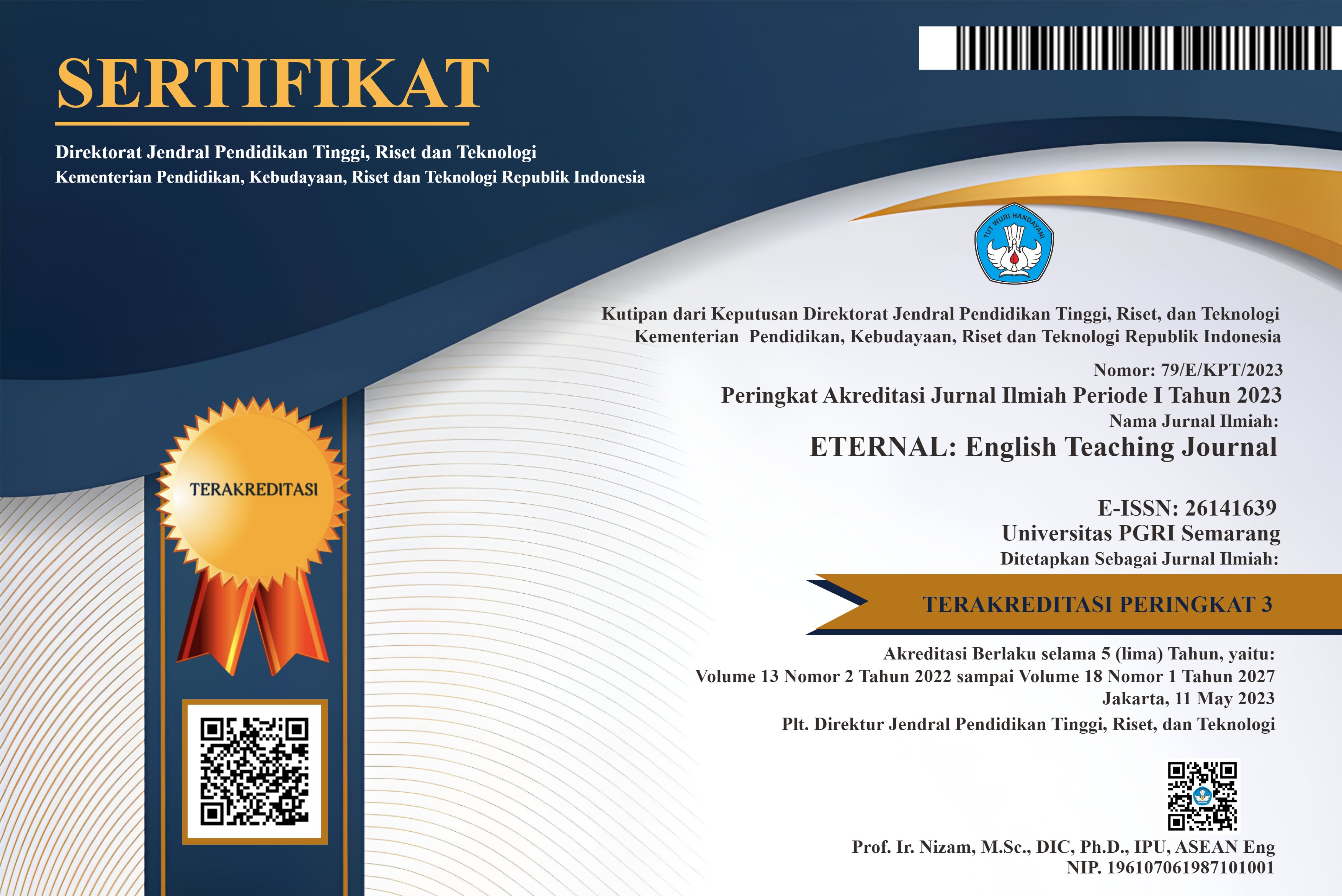Enhancing Vocabulary Mastery in Narrative Text through Wordwall Game
DOI:
https://doi.org/10.26877/eternal.v15i2.657Keywords:
Vocabulary, Narrative Text, Classroom Action Research, Wordwall GameAbstract
Enhancing vocabulary mastery through the Wordwall game is important because students often face several common difficulties in mastering English vocabulary, such as lack of engagement, limited exposure to new words, and difficulty in retaining vocabulary. This study aims to answer whether the use of the Wordwall game can improve eighth-grade students' English vocabulary mastery. Classroom action research was conducted using four stages: planning, acting, observing, and reflecting. Data were gathered via observation, questionnaires, and testing. The study revealed that integrating the Wordwall game enhanced vocabulary proficiency and increased motivation among students in their English language acquisition. The game stimulated students' comprehension and retention of relevant vocabulary, fostering their enthusiasm for acquiring English. In addition, there was a notable improvement in students' proficiency in vocabulary. The study showed that students who used the Wordwall game had higher vocabulary test scores compared to before using the game. This study provides evidence that students have attained favorable learning outcomes and exhibit high levels of motivation to expand their vocabulary through the Wordwall game. They recognized that the Wordwall game was beneficial in facilitating their acquisition of English vocabulary. It is recommended that teachers use this strategy and regularly evaluate teaching techniques.
References
Learners ’ Vocabulary Acquisition : An Investigation Of Individual SMS-Based Reporting. Teaching English with Technology, 20(5), 125–146.
Arsini, N. N., Santosa, M. H., & Marsakawati, N. P. E. (2022). Hospitality School Students’ Perception on the Use of Wordwall to Enrich Students’ Work-Ready Vocabulary Mastery. Elsya : Journal of English Language Studies, 4(2), 124–130. https://doi.org/10.31849/elsya.v4i2.8732
Çil, E. (2021). The effect of using wordwall.net in increasing vocabulary knowledge of 5th grade EFL students. Language Education & Technology (LET Journal), 1(1), 21–28. http://langedutech.com
Hasram, S., Arif, F. K. M., Nasir, M. K. M., Mohamad, M., Daud, M. Y., Rahman, M. J. A., & Mohammad, W. M. R. W. (2020). Online Games for Primary School Vocabulary Teaching and Learning: A Literature Review. Creative Education, 11(11), 2327–2336. https://doi.org/10.4236/ce.2020.1111170
Hasram, S., Nasir, M. K. M., Mohamad, M., Daud, M. Y., Rahman, M. J. A., & Mohammad, W. M. R. W. (2021). The Effects of WordWall Online Games (WOW) on English Language Vocabulary Learning Among Year 5 Pupils. Theory and Practice in Language Studies, 11(9), 1059–1066. https://doi.org/10.17507/tpls.1109.11
Ilahi, L. W., Komara, C., & Ismail, Y. (2022). EFL Students’ Perception of Wordwall.Net Used as Media for Learning English Grammar. UHAMKA International Conference on ELT and CALL (UICELL), December, 22–23.
Jannah, M., & Syafryadin, S. (2022). EFL students’ perspectives on the use of Wordwall.net as vocabulary learning media. ELT Forum: Journal of English Language Teaching, 11(2), 115–124. https://doi.org/10.15294/elt.v11i2.57120
Khan, R., Radzuan, N., Shahbaz, M., & Ibrahim, A. (2018). EFL instructors’ perceptions on the integration and implementation of MALL in EFL classes. International Journal of Language Education and Applied Linnguistics (IJLEAL), 08(2), 39–50. http://ijleal.ump.edu.my/
Klimova, B., & Polakova, P. (2020). Students’ Perceptions of an EFL Vocabulary Learning Mobile Application. Education Sciences, 10(2), 37. https://doi.org/10.3390/educsci10020037
Mulyadi, D. (2018). Efl student teachers’ perception and challenges toward online platforms in language pedagogy. 2nd English Language and Literature International Conference (ELLiC), 2, 321–323.
Mulyadi, D., Arifani, Y., Wijayantingsih, T. D., & Budiastuti, R. E. (2020). Blended learning in English for specific purposes (ESP) instruction: lecturers’ perspectives. Computer-Assisted Language Learning Electronic Journal, 21(2), 204–219. http://callej.org/journal/21-2/Mulyadi-Arifani-Wijayantingsih-Budiastuti2020.pdf
Mulyadi, D., Singh, C. K. S., Setiawan, A., & Prasetyanti, D. C. (2023). Technology-enhanced task-based language teaching toward their self-directed language learning: ESP learners’ views. Studies in English Language and Education, 10(3), 1326–1341. https://doi.org/10.24815/siele.v10i3.27910
Mulyadi, D., Wijayatiningsih, T. D., Budiastuti, R. E., Ifadah, M., & Aimah, S. (2020). Technological pedagogical and content knowledge of ESP teachers in blended learning format. International Journal of Emerging Technologies in Learning, 15(6), 126–139. https://doi.org/10.3991/ijet.v15i06.11490
Riswalastika, E., Susanto, D. A., & Suwarti, T. S. (2023). Using Pop-Up Book in E-Learning to Improve Students Vocabulary Mastery Student. Edusia: Jurnal Ilmiah Pendidikan Asia, 3(1), 15–27. https://doi.org/10.53754/edusia.v3i1.184
Rodríguez-escobar, C., Cuevas-lepe, J., & Maluenda-parraguez, L. (2023). Assessing the Effectiveness of Wordwall.net as a Vocabulary Learning Tool: Pre-Service EFL Teachers’ Perspectives. Journal of Education and Practice, 14(31), 41–51. https://doi.org/10.7176/jep/14-31-04
Rosyada-AS, A., & Apoko, T. W. (2023). Investigating English Vocabulary Difficulties and Its Learning Strategies of Lower Secondary School Students. Journal of Languages and Language Teaching, 11(3), 489. https://doi.org/10.33394/jollt.v11i3.8404
Tang, Y., Du, X., Hung, J.-L., Li, H., Tang, H., & Xie, Y. (2024). Exploring the effects of roles and group compositions on social and cognitive interaction structures in online collaborative problem-solving. Education and Information Technologies. https://doi.org/10.1007/s10639-024-12569-3
Urdanivia Alarcon, D. A., Talavera-Mendoza, F., Rucano Paucar, F. H., Cayani Caceres, K. S., & Machaca Viza, R. (2023). Science and inquiry-based teaching and learning: a systematic review. Frontiers in Education, 8. https://doi.org/10.3389/feduc.2023.1170487
Wulandari, W., Andris, D., & Hawa, F. (2024). Exploring Bamboozle as Games-Based Learning Media to Support Students’ Vocabulary: Its application in the classroom. INNOVATIVE: Journal Of Social Science Research, 4(2), 6542–6551. https://j-innovative.org/index.php/Innovative
Wulandari, W., Andris Susanto, D., & Hawa, F. (2024). Using Bamboozle Games To Improve Students’ Vocabulary In Understanding Narrative Text. Jurnal Ilmiah Multidisiplin, 2(3), 141–147. https://ejournal.lumbungpare.org/index.php/jim/index







